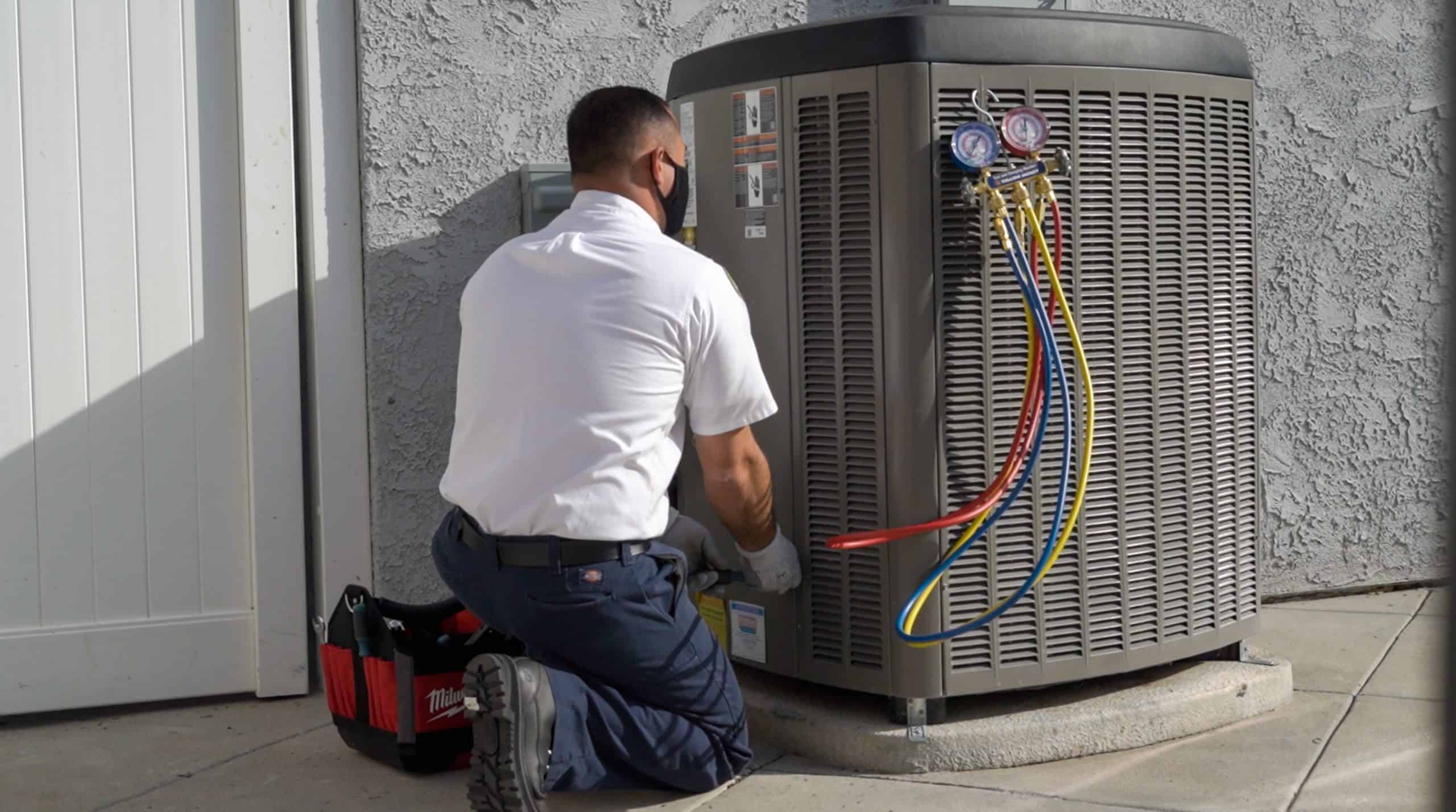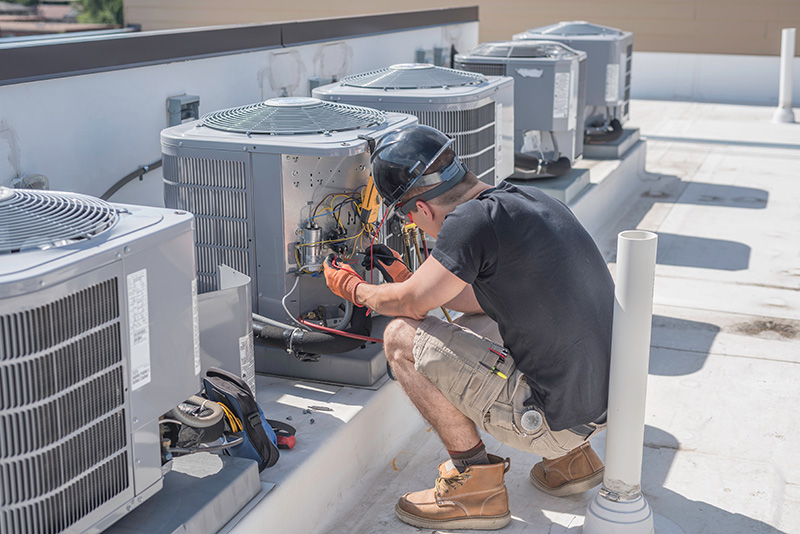Schedule a Maintenance Visit Today with DMAKS HVAC Experts.
Schedule a Maintenance Visit Today with DMAKS HVAC Experts.
Blog Article
Exactly How to Pick the Right Cooling And Heating System for Your Requirements
Choosing the proper cooling and heating system is an essential decision that needs careful consideration of various elements. Begin by examining your home's dimension, design, and unique needs, as these aspects determine the required ability and setup of the system. In addition, establishing a budget that encompasses setup and long-lasting operational expenses is crucial. As you evaluate your options, recognizing power performance ratings and the ramifications of your neighborhood climate will certainly play a substantial duty in your option. However, the myriad of system kinds offered can complicate this procedure, leading one to ask yourself which course inevitably leads to ideal comfort and effectiveness.
Examine Your Home Dimension
Examining your home size is a vital very first action in selecting the ideal Heating and cooling system. A HVAC system that is too small will struggle to keep comfy temperatures, leading to increased power intake and use on the unit.
To precisely examine your home dimension, determine the square footage of each space, thinking about aspects such as ceiling height and the layout. Furthermore, think about the insulation high quality and the number of windows, as these aspects impact thermal performance. Residences with open floor strategies may need different system configurations compared to those with numerous divided rooms.
Using the Handbook J load estimation technique can offer a more specific quote of your heating and cooling needs. This approach represent various variables, including local environment, solar gain, and occupancy patterns. By carefully reviewing these elements, you can ensure that your picked a/c system is appropriately sized, leading to improved comfort, energy efficiency, and long life of the devices.
Determine Your Spending Plan
Determining your budget is a crucial step in the cooling and heating system choice procedure, as it sets the criteria for your choices - DMAKS HVAC. A HVAC system is a substantial investment, and recognizing your financial limitations will certainly help tighten down selections that fit within your methods
Begin by examining not only the preliminary acquisition price however additionally installation expenses, which can vary dramatically depending on the complexity of the task. Furthermore, think about recurring expenditures such as upkeep, repair services, and energy usage. A system might show up budget friendly initially however can cause greater expenses with time if it is much less efficient.
It is advisable to assign a backup fund for unforeseen costs that might occur during setup or preliminary system modifications (DMAKS HVAC). Furthermore, check out funding choices or discounts that may be available, as these can ease the burden of upfront costs
Inevitably, having a clear budget plan permits you to engage with heating and cooling professionals extra efficiently, ensuring you get tailored recommendations that lines up with your financial goals and home needs. By being thorough about your spending plan, you can make educated choices that improve convenience without jeopardizing financial security.
Evaluate Power Effectiveness
Power efficiency plays an essential function in the total performance and cost-effectiveness of your heating and cooling system. When picking a system, it is vital to consider its power effectiveness rankings, as these figures directly influence your utility expenses and environmental footprint. Seek systems with a high Seasonal Energy Effectiveness best site Proportion (SEER) for cooling and a high Annual Fuel Utilization Performance (AFUE) score for home heating. Higher scores show higher performance, meaning more convenience for much less energy usage.
Furthermore, take into consideration the Power Star accreditation, which symbolizes that the system fulfills stringent efficiency guidelines set by the Epa. Spending in a Power Star-rated HVAC system can result in significant cost savings in time, especially in areas with extreme temperature changes.
One more element to assess is the system's size and capacity. An oversized or undersized unit can lead to inefficiency and raised power expenses. DMAKS HVAC. Appropriate sizing, commonly established with a Hand-operated J lots calculation, guarantees that the system operates at optimum performance


Think About Climate and Atmosphere
When picking a HVAC system, it is essential to think about the regional environment and ecological problems, as these factors significantly influence the system's performance and efficiency. Different areas experience differing temperature level extremes, humidity degrees, and seasonal adjustments, every one of which influence home heating and cooling down demands.

Furthermore, neighborhood environmental variables, such as air high quality and potential irritants, must inform your choice. Equipments equipped with advanced filtering best site technologies can help reduce pollutants and supply cleaner air. In addition, consider the power resources available in your area-- some cooling and heating systems are more effective when powered by gas or renewable energy resources.
Inevitably, straightening your HVAC system choice with your regional environment and ecological considerations will cause boosted convenience, improved efficiency, and lower energy expenses.
Explore System Types and Features
As house owners look for to maximize comfort and performance, discovering the numerous sorts of HVAC systems and their unique attributes becomes important. The main sorts of heating and cooling systems include central air conditioning, warm pumps, ductless mini-split systems, and heating systems. Each system provides unique benefits tailored to different needs and preferences.
Central air conditioning systems provide consistent air conditioning throughout a home, making them excellent for bigger spaces. Heatpump function as both heating and cooling down options, using electrical energy to transfer heat, which can cause lower power prices. Ductless mini-split systems are ending up being progressively popular due to their adaptability and simplicity of setup, allowing home owners to control the temperature level in private rooms without extensive ductwork.

Final Thought
Finally, picking the appropriate cooling and heating system necessitates careful consideration of different elements, consisting of home dimension, budget plan restraints, power performance, local climate, and available system types. An extensive evaluation of these aspects makes sure ideal convenience and cost-effectiveness. By complying with a structured technique, homeowners can make informed decisions that straighten with their details demands and choices, eventually causing improved indoor air quality Get the facts and power cost savings.
Report this page